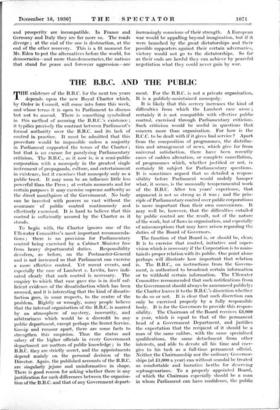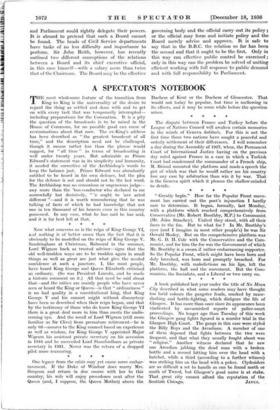THE B.B.C. AND THE PUBLIC T HE existence of the B.B.C.
for the next ten years depends upon the new Royal Charter which, by Order in Council, will come into force this week; and whose terms it is open to Parliament to discuss but not to amend. There is something symbolical in this method of assuring the B.B.C.'s existence ; it typifies precisely the contrast between Parliament's formal authority over the B.B.C. and its lack of control in practice. It must be admitted that this procedure would be impossible unless a majority in Parliament supported the terms of the Charter ; but that is no excuse for paralysing Parliamentary criticism. The B.B.C., as it now is, is a semi-public corporation with a monopoly in the greatest single instrument of propaganda, culture, and entertainment in .existence, but it exercises that monopoly only as a public trust. It may soon be an influence little less powerful than the Press ; at certain moments and for certain purposes it may exercise supreme authority as the direct mouthpiece of the Government. No body can be invested with powers so vast without the assUranoe of public control continuously and effectively exercised. It is hard to believe that this control is sufficiently assured by the Charter as it stands.
TO • begin With, the Charter ignores one of the Ullsivater COnniiittee's most important recommenda- tions; • there is no provision for Parliamentary. contra - being exercised by a Cabinet Minister free from heavy departmental duties. Responsibility devolves, as before, on the Postmaster-General and is not increased so that Parliament can exercise a more effective control. Yet recent events, and especially the case of Lambert v. Levita, have indi- cated clearly that such control is necessary. The enquiry to which that case gave rise is in itself suf- ficient evidence of the dissatisfaction which has been aroused, and it is interesting that the kind of dissatis- faction goes, in some respects, to the centre of the problem. Rightly or wrongly, many people believe that the internal organisation of the B.B.C. is marred by an Atmosphere of mystery, insecurity, and arbitrariness which would be a discredit to any public department, except perhaps the Secret Service. Gossip and rumour apart, there are some facts to strengthen this suspicion. Thus the status and salary of the higher officials in every Government department are matters of public knowledge ; in the B.B.C. they are strictly secret, and the appointments depend mainly on the personal decision of the Director. Again, the published accounts of the B.B.C. are singularly jejune and uninformative in shape. There is good reason for asking whether there is any justification for such differences between the organisa- tion of the B.B.C. and that of any Government depart, ment. For the B.B.C. is not a private organisation. It is a publicly-maintained monopoly.
It is likely that this secrecy increases the kind of difficulties from which the Lambert case arose ; certainly it is not compatible with effective public control, exercised through Parliamentary criticism. Such criticism would be useful in questions that concern more than organisation. For bow is the B.C.C. to be dealt with if it gives bad service ? Apart from the composition of programmes, the distribu- tion and arrangement of news, which give far from universal satisfaction, there have been recently cases of sudden alteration, or complete cancellation, of programmes which, whether justified or not, is certainly fit subject for Parliamentary questions. It is sometimes argued that so detailed a respon- sibility before Parliament would unduly hamper what, it seems, is the unusually temperamental work of the B.B.C. After ten years' experience, that argument is not so strong as it was ; and the prin- ciple of Parliamentary control over public corporations is more important than their own convenience. It may well be, however, that the difficulties entailed by public control arc the result, not of the nature of the work, but of flaws in organisation, and especially of misconceptions that may have arisen regarding the duties of the Board of Governors.
The function of that Board is, or should be, clear. It is to exercise that control, initiative and super- vision which is necessary if the Corporation is to main- tain its proper relation with its public. One point alone perhaps will illustrate how important that relation is. The B.B.C., on instructions from the Govern- ment, is authorised to broadcast certain information or to withhold certain information. The Ullswater Committee recommended that such notifications from the Government should always be announced publicly: the Charter leaves it to the B.B.C.'s discretion whether to do so or not. It is clear that such discretion can only be exercised properly by a fully responsible body. It is for the Governors to provide this respon- sibility. The Chairman of the Board receives £8,000 a year, which is equal to that of the permanent head of a Government Department, and justifies the expectation that the recipient of it should be a man of the same calibre, with the same specialised qualifications, the same detachment from other interests, and able to devote all his time and ener- gies to his task as a full-time permanent official. Neither. the Chairmanship nor the ordinary Governor- ships (at 11,000 a year) can without scandal be treated as comfortable and lucrative berths for deserving septuagenarians. To a properly appointed Board, of which the Chairman especially should be a man in whom Parliament can have confidence, the public and Parliament could rightly delegate their powers. It is absurd to pretend that such a Board cannot be found. The heads of Civil Service departments have tasks of no less difficulty and importance to perform. Sir John Reith, however, has recently outlined two different conceptions of the relations between a Board and its chief executive official; in this case himself—with a salary more than twice that of the Chairman. The Board may be the effective governing body and the official carry out its policy ; or the official may form and -initiate policy and the Board merely advise and approve.. It is safe to say that in the B.B.C. the relation so far has been the second and that it ought to be the first. Only in this way can effective public control be exercised ; only in this way can the problem be solved of uniting efficient working with full response fo public demand and with full responsibility to Parliament.











































 Previous page
Previous page